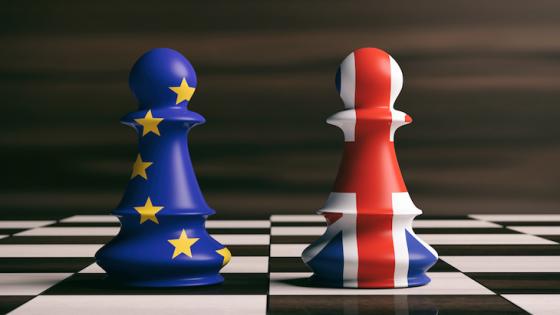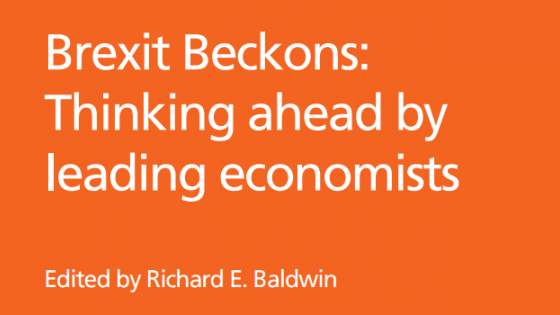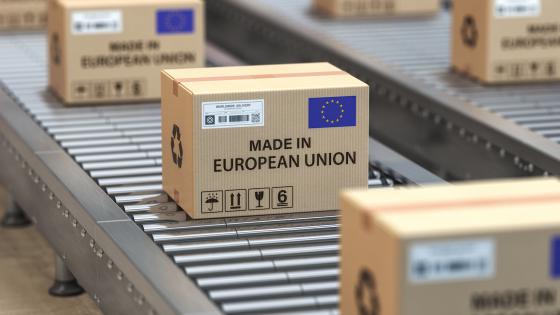First posted on:
mainly macro, 27 July 2018
We have entered the stage where everyone seems to be worrying about a No Deal Brexit. It was inevitable that the EU would use this as a threat - that is the whole point of the A50 process. Rather less obvious is that the UK would do so as well: we have master tactician David Davis - this is going to hurt us more than you so you should be very afraid - to thank for that. But to be fair, appearing irrationally stupid enough to contemplate No Deal is about the only weapon the government has in its negotiations with the EU. So both sides talk up its chances, which naturally leads everyone to panic. If you want an antidote, this post is for you, although please bear in mind that what follows is about probabilities not certainties, and you can never rule out the possibility of this government doing something really stupid.
Stage one, recounted here, was the break with the Brexiter hardliners to re-engage with the EU after six months backtracking from the December agreement. I call the second stage as what Theresa May has to do to get over the March 2019 hurdle that sees the UK exit from the EU.1 Unfortunately, given parliament’s failure to provide any guide to the executive, our only clue about what this entails is to think about what is in Theresa May’s interests. (For May, unlike the Brexiters, there is no Brexit ideology we need to worry about, so its interests rather than ideas that matter.)
May’s primary interest is to get a deal. She does not want to go down in history (and down is where she would go if there was no deal) as the Prime Minister who led us to a disastrous No Deal Brexit. Her secondary interest is in perpetual Brexit, by which I mean negotiations that continue to keep Brexit in the news so that a majority of Conservative MPs dare not allow an election for leader and so she stays as PM. These interests tell us what May will try to do.
Perpetual Brexit requires leaving most of the negotiation of what the final relationship will be with the EU until the transition period. That might seem odd, given that this final relationship is what the Chequers document is all about, but see below. I think the EU will probably be broadly OK with that (although I do not think they should be),2 as long as May agrees to the Irish backstop. As I argued here, May will do all she can to convince the EU that it is politically impossible for her to agree to this backstop. But the likely outcome is that she will fail, and her interests therefore require that she does accept the backstop to get a deal.
The reason why accepting a backstop is politically difficult for her is that any deal that includes it is likely to be opposed by both the DUP and Brexiters. If Labour vote against the final deal then she does not have the votes in parliament for the deal. A potential way around DUP opposition is to convince them that the UK during transition will negotiate a deal that makes the backstop redundant. (For some speculation on all this, see Peter Foster here.)That is a key reason for the Chequers document. But the DUP are as unlikely to accept her word as the EU, so they would require some form of words in any EU agreement that could be held as a commitment.
In passing, if you have a sense of deja vu about all this, you are not imagining anything. This is what happened at the final stages of the December agreement.
The problem with this approach is that anything that would make the DUP happy is likely to worry Brexiters. The more that May says the UK will stay close to Europe so the backstop will never happen, the more the ERG will talk about becoming a vassal state to the EU. It looks, at the moment, like an impossible position. But many things can happen between now and parliament’s vote on any deal with the EU, so I think it will be foolish to discount the possibility that she might just succeed. If she does, we have what I’ve called perpetual Brexit, which in reality means transition=BINO for some time if not forever. (The final deal will probably be BINO with face saving: perhaps I should call this BINOFACE.)
What threats could May invoke to get any deal through parliament. In the negotiations leading up to the deal both the UK and EU will use the threat of No Deal. However once the deal is made threatening No Deal if parliament fails to vote for it is counterproductive if she is trying to convince Brexiters, because No Deal is exactly what these idiots want. A threat of no Brexit however might inspire her Remain rebels. The same would be true of a threat of a second referendum. Perhaps the best threat for her is a general election, because neither the Brexiter nor Remain rebels would want to be responsible for a Corbyn government. The problem with any threats however is that this is not a repeated game, so there is no incentive for her to go through with her threat if it also conflicts with her interests, and people know that.
If she fails to win a vote on the final deal, I still cannot see leaving without any deal as a likely option. It just isn’t in anyone’s interests to let that happen, apart from the Brexiters. But it would be hard for the EU to agree to an extension of A50 on the hope that something turns up. This is where a referendum might become a reality (combined with an extension), as a way out of an impasse. If that happens, it will be the ultimate irony that Brexiter intransigence gives the Remainers what they want. However there is a caveat, and that is that May will propose a referendum with a two way choice between her deal and No Deal. There would be a final fight in parliament to get Remain on the ballot paper in some way.
I doubt, however, that May would want to fight a referendum where Remain is a possibility, because it is quite likely that Remain would win, particularly if Labour leads the campaign for Remain. That would make her position very difficult. As a result, she may prefer the option of a general election. A lot will depend on the polls at the time. But the bottom line is that either an election or a referendum (accompanied by an A50 extension) are more likely than crashing out with No Deal if parliament rejects the final deal. But don’t expect either side to tell you that.
The possibility of parliament voting down any deal and even the possibility of no deal, with the government stockpiling medicines etc, should focus open minds on how ridiculous our position has become. Brexit may get voted down because no one is happy with the form of Brexit we will get. Yet neither the government or parliament is able to say this is ridiculous and we should stop in now. Ostensibly this is because they feel they have to implement the ‘will of the people’. But this is so short sighted, because even the people who voted Leave will be unhappy with the Brexit they get when they see what it is. They voted, it should always be noted, for the “easiest trade deal in history” (Fox) where “we hold all the cards” (Gove). We now know better, but it seems our representative democracy is paralysed by a vote for a fantasy.
Endnotes
[1] I’m not going to stick my neck out even further than I am in this post by saying how many stages there will be, beyond saying that it is at least three. The point about calling it an endgame is that the result is clear with best play from the winning side.
[2] Some Remainers do not like me saying so, but the willingness of the EU to keep the terms on which we leave vague when it is voted on in parliament is a bit of an insult to democracy. None of their business, you may say, but they are as much part of theis negotiation as the UK. The majority of UK voters, and probably MPs, would not vote for a BINO type deal where we pay, obey but have no say, and the EU side must know that is where we are heading if a border in the Irish Sea is ruled out.



